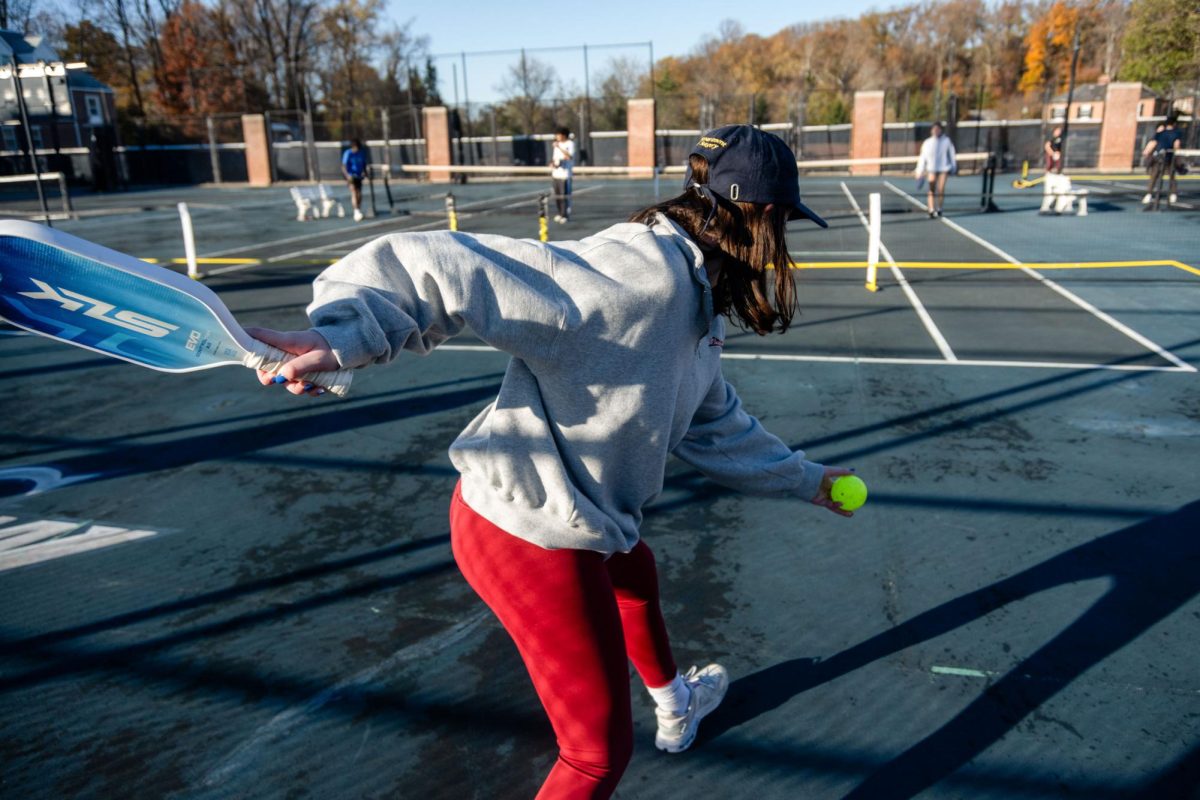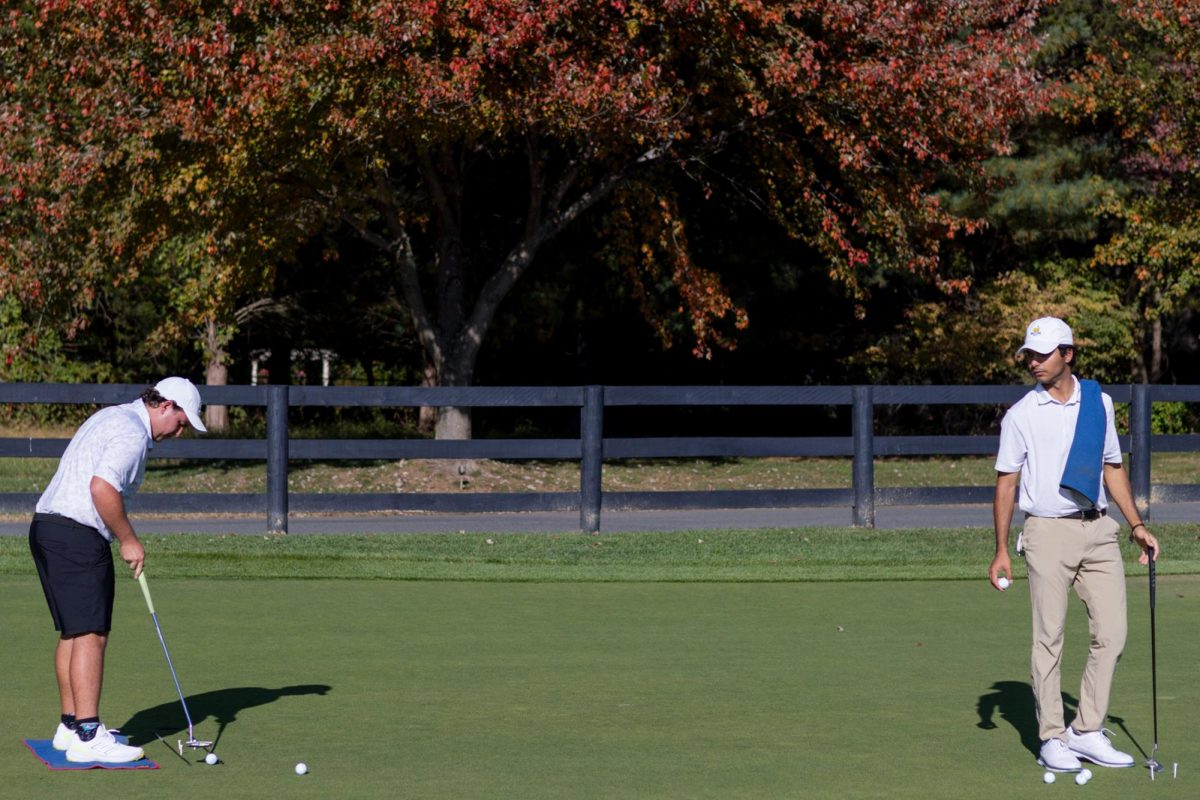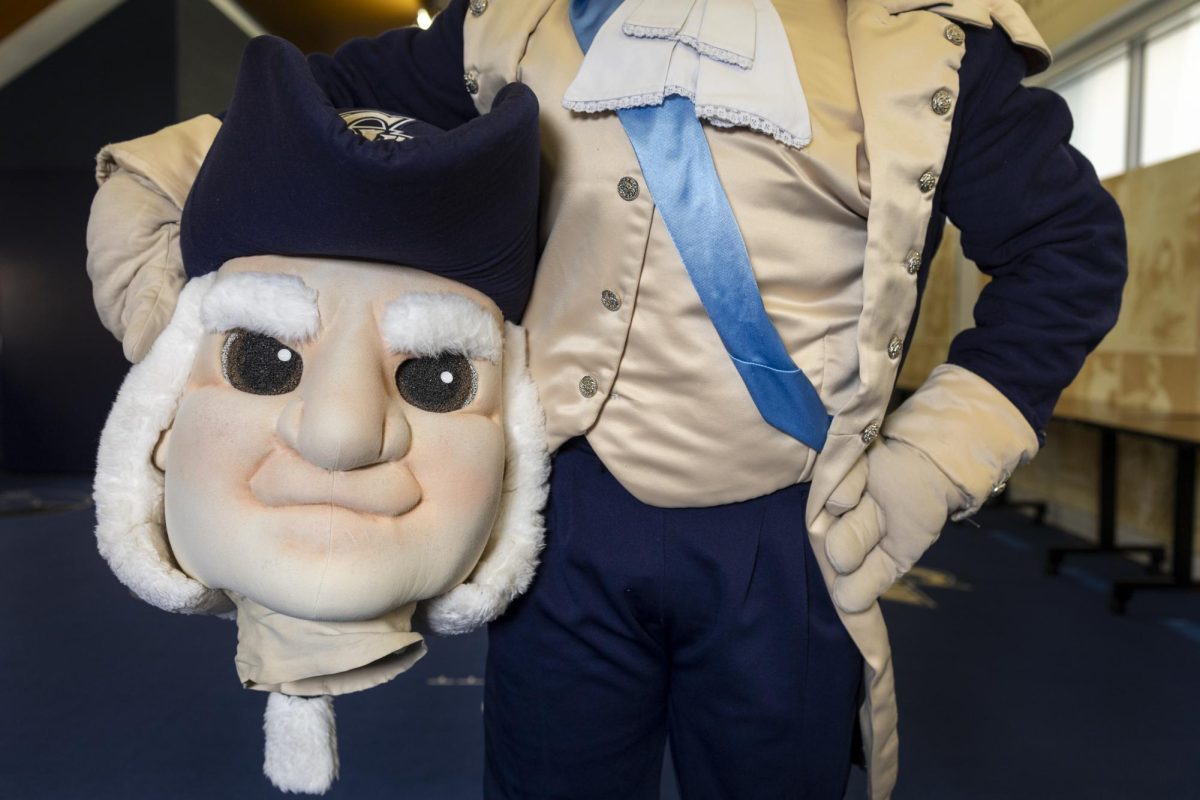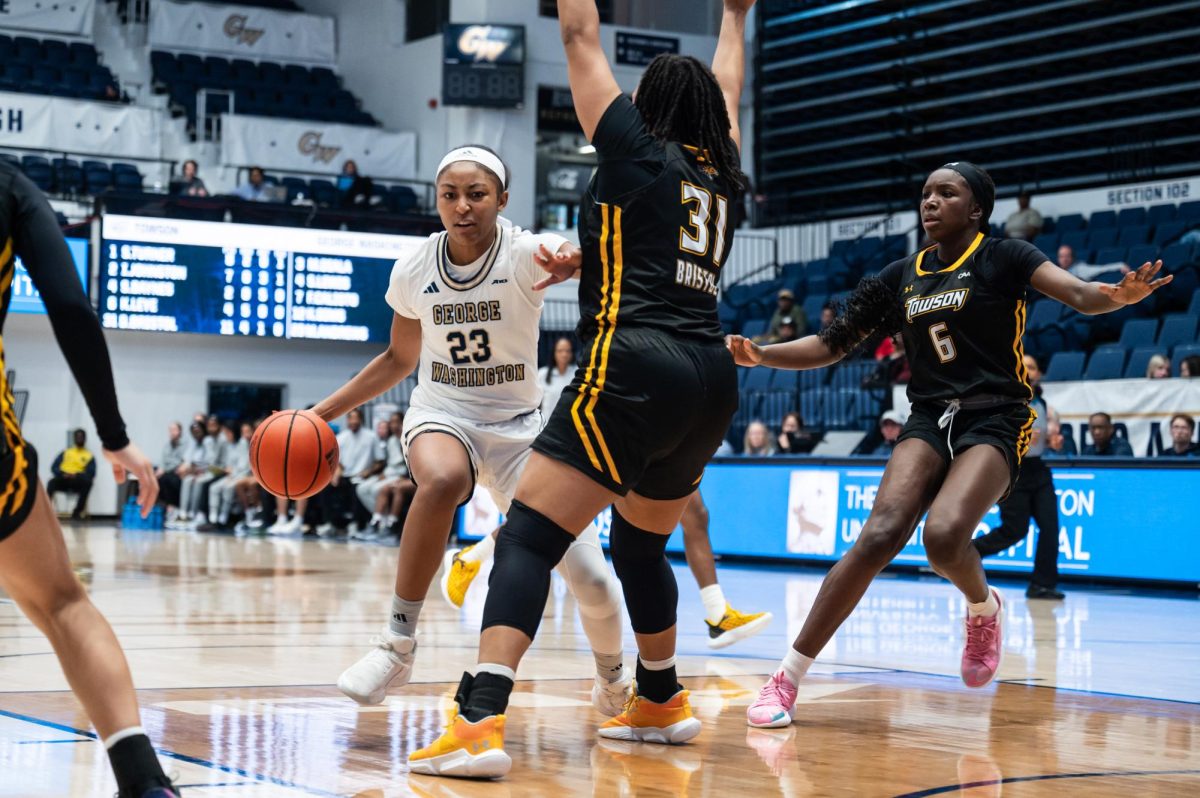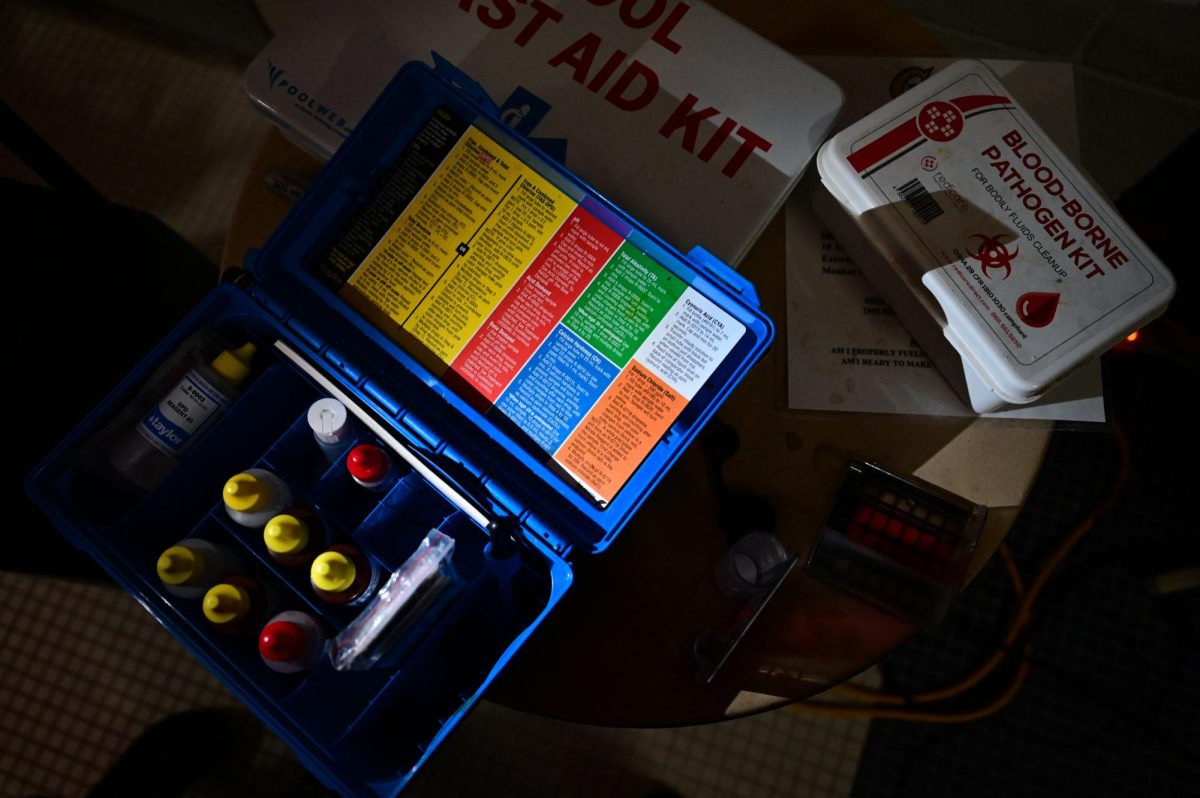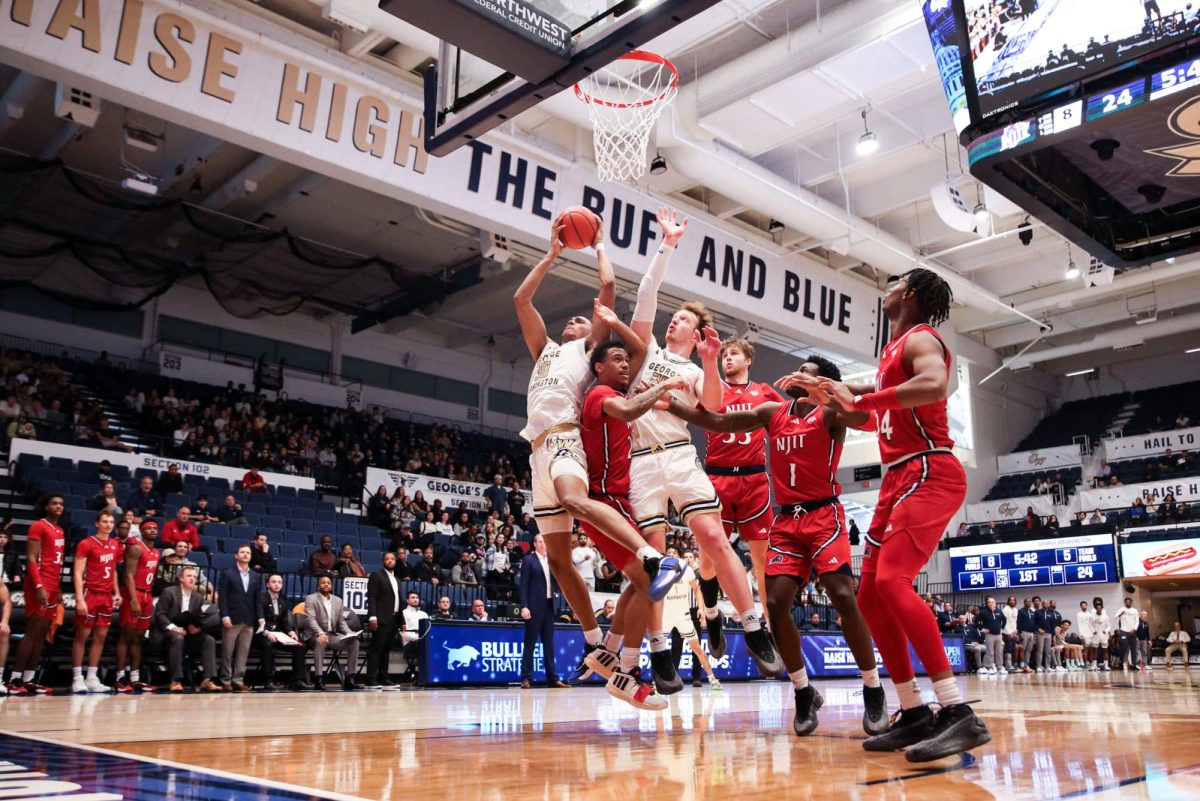When the Atlantic 10 postponed fall sports until the spring semester, individual schools were left to decide whether fall athletes could come back to campus and train in person.
At GW, some squads like men’s and women’s basketball and women’s soccer have returned to campus for training, according to their respective social media pages, but officials have declined to say how many student-athletes are back on campus and what teams they’re from. Fellow conference schools are also bringing their athletes back, prioritizing social distancing, face coverings and continued testing as they begin practicing.
Athletic department spokesperson Brian Sereno said late last month that the athletic department is still finalizing its return to athletics plan, but the plan will abide by NCAA guidelines and in its testing protocol and workouts.
Student-athletes will only be allowed to use facilities, like weight rooms, under the direct guidance of coaches, strength and conditioning coordinators or sports medicine personnel, Sereno said. He added that any athletic activity will include the “latest guidance from medical professionals.”
Here’s a roundup of how athletes are training across the A-10 this semester:
Dayton
Dayton wrote in its return-to-campus plan that its athletic department would announce official guidelines for gatherings and events at a later date.
Athletes can practice in person using Dayton’s facilities. Dayton’s women’s soccer team tweeted Aug. 16 that the squad underwent COVID-19 testing, physicals and bonded with socially distant “speed dating bingo.” Preparations were also made to the court and gym for the volleyball team to practice and train, head coach Tim Horsmon tweeted Aug. 12.
Athletic Director and Vice President Neil Sullivan told Flyer News Aug. 17 the department will try to make conditions as “safe as possible” for student-athletes to continue to practice.
Duquesne
Duquesne’s official “Return to Athletics” policy states that the officials aim to create a “safe and manageable return,” prevent cross-contamination among teams and establish a tracing system.
The document requires athletes to wear proper personal protective equipment, practice good hygiene and report when they’re feeling sick. Prior to starting practices again, athletes were required to quarantine for 14 days. Players on teams like the bowling squad are now holding practices while wearing face coverings.
After isolating, athletes were allowed to begin a three-phase return to full activity. Phase one allowed groups of 10 or fewer athletes to compete in non-contact training. Groups of 50 or fewer athletes could participate in full-contact training during phase two. Phase three permits a full resumption of practice activities with social distancing measures in place.
Fordham
Like Duquesne, Fordham will undergo a three-phase return to athletics plan. Only 24 people will be allowed to participate in strength and conditioning exercises during phase one. Phase two allows for 50 people to gather for non-contact practices.
In the final phase, teams will return to practice with “distancing guidelines, sanitation and precautions.” Teams will tentatively begin practicing in person Tuesday, according to the Fordham Athletics COVID-19 Health and Safety plan. When practices resume, players are required to wear face coverings “whenever feasible,” coaches must use electronic whistles and practices will be mostly held outdoors.
Athletes coming to campus from “restricted states,” as determined by the New York Health Department, will need to quarantine for 14 days upon arrival. The University’s sports medicine department will conduct contact tracing.
George Mason
Players are required to quarantine for two weeks at home before returning to practice and take a daily health assessment that includes a “wellness screening” and temperature check.
Athletic personnel were provided with two cloth face masks and will be required to wear a face covering. Locker rooms will remain closed and groups will be allowed to work out in weight rooms and athletic facilities.
The school is conducting scheduled testing for groups of student-athletes, administering tests five minutes apart to ensure social distancing. Before returning to campus, athletes underwent Polymerase Chain Reaction testing prior to arrival on campus, a release states.
Rhode Island
Fall sports teams will be able to train this semester “in accordance with safety protocols,” and group size limitations and alternating schedules are being considered, according to a school webpage.
Rhode Island Athletic Director Thorr Bjorn said July 24 the athletic department was working on a “strategy and plan” to allow student-athletes to practice in the fall. The school is preparing athletic facilities for returning players and promised more detailed plans in the future.
Saint Joseph’s
The athletic department’s return plan includes a phased reopening with time limits on practices, caps on how many athletes can use the facilities at one time and social distancing during workouts.
A member of the athletic training staff must be present during all practices or workouts and student-athletes, coaches and support staff will be required to wear face masks throughout the three phases.
Phase one of the plan, which runs through Oct. 2, permits skill groups and strength and conditioning pods of up to 10 student-athletes. Saint Joseph’s doesn’t expect to begin full practices until Nov. 3 when phase three kicks in.
Saint Louis
Athletic director Chris May said the school will fully support student-athletes and ensure they have “the very best intercollegiate athletic experience possible,” allowing in-person practice during the fall.
Symptom reports and temperature checks are required from student-athletes prior to participating in athletics. Plexiglass barriers have been added between training tables, and athletes must schedule a time for physical therapy to limit the number of people inside training facilities, Stu Durando of the St. Louis Post Dispatch reported.
Student-athletes also need to spend 10 to 15 minutes sanitizing any weight room equipment they used during training and need to change into fresh clothes before moving between the weight room and training room, Durando reported.
VCU
VCU’s official reopening guidelines included testing when athletes came to campus, daily health screenings and temperature checks.
Noah Fleischman of The Commonwealth Times reported that the majority of fall programs returned to campus Aug. 17 after being tested for COVID-19. The decision to practice was left to each team, and field hockey opted to make an earlier return to campus Aug. 10, Fleischman reported.
In late August, a cluster of 44 COVID-19 cases broke out among VCU players, totaling nearly half of VCU’s 93 cases as of Sept. 1.
St. Bonaventure
Student-athletes were required to quarantine for two weeks, receive two negative COVID-19 tests and undergo an in-person physical exam before resuming athletic activities on campus.
Each sport must follow outlined protocols ranging from face mask requirements, equipment and facility sanitization, social distancing and facility capacity limits. Student-athletes began in-person practices as early as this week.
Richmond
Richmond brought its student-athletes back to campus in waves. Football and men’s and women’s basketball players returned to campus on July 15. Field hockey, women’s soccer and men’s and women’s cross country were slotted to return in the second phase in late August.
The Spiders outlined in a press release health guidelines for returning student-athletes that included precautions like a self-quarantine period, pre-participatory medical exams and regular temperature checks. Masks and social distancing are also required and locker rooms are cleaned daily, the release states.
Davidson
Student-athletes returned to campus last month and began practicing in person. Officials at Davidson said its teams were following protocols, which include social distancing and equipment cleaning by the NCAA, WBTV reported. Training is also occurring outdoors, WBTV reported.
In late August, a cluster of COVID-19 cases spread among Davidson baseball players. A University spokesperson said transmission likely stemmed from “social settings,” and Davidson suspended all baseball activities for two weeks.
La Salle
The Explorers will follow a five-phase reopening plan to resume practicing for the fall. Face coverings are mandated when not participating in a workout and physical distance must be maintained while not in physical activity, according to the plan.
All athletes, coaches and staff must pass a health screening and temperature check before entering an athletic building. Student-athletes coming from “hot spot” areas and internationally will be required to quarantine for 14 days, the plan stipulates.
Massachusetts
After revising the university’s initial reopening plans, Massachusetts said its athletic department is working with the NCAA, state and university to establish fall guidelines.
The Minutemen’s football team, including coaches, coordinators and student-athletes, returned to campus before Aug. 2 and were working out at McGuirk Stadium, Richard Thompson of the Boston Herald reported. But Massachusetts opted to cancel its football season due to the pandemic.
Emily Maise contributed reporting.



